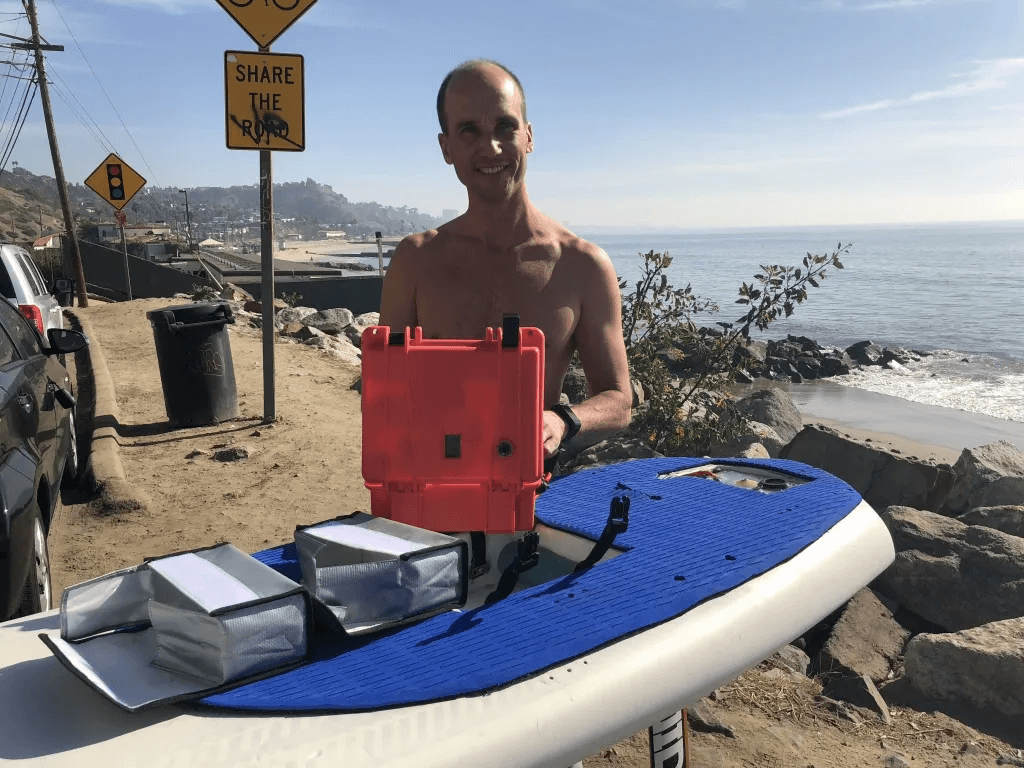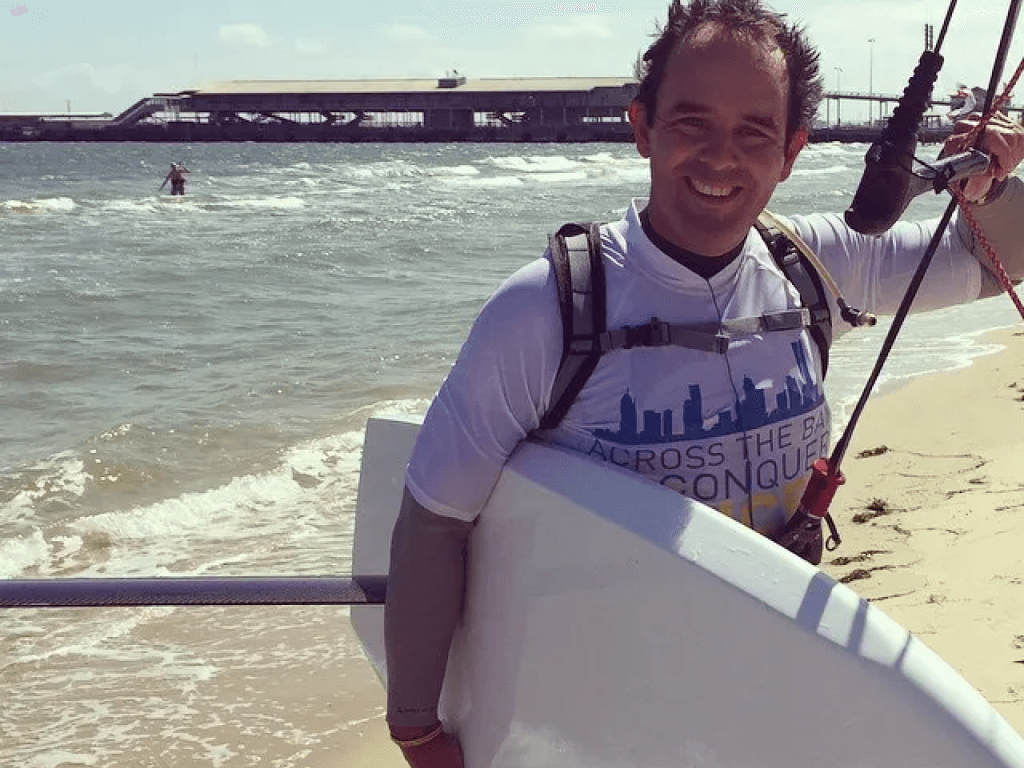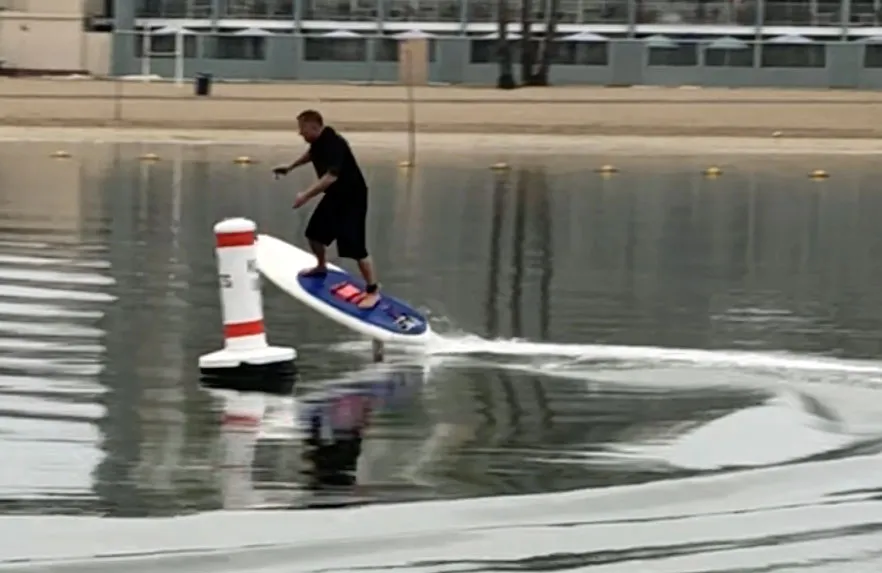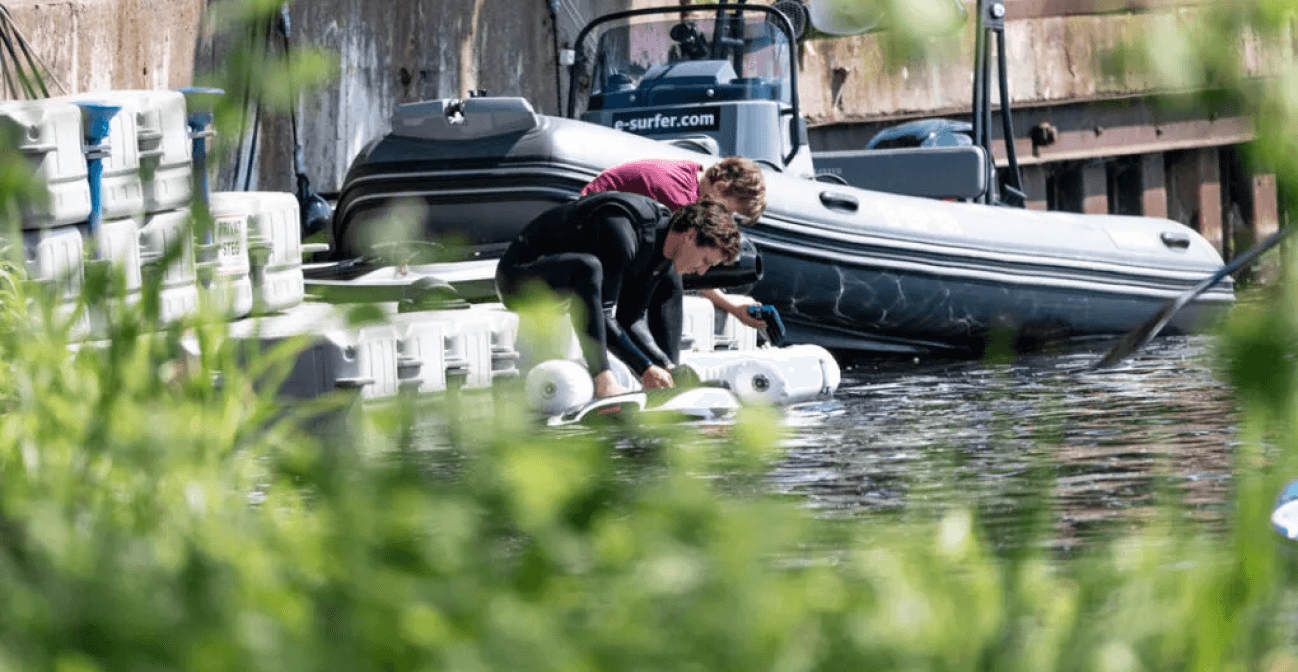

Depending on your skills, we will choose the best eFoil for you. Of course you can also give the eFoil lessons as a gift certificate. A great present for your family or friends!
Our team has already given hundreds of eFoil lessons since 2018 and teaches exclusively on premium eFoil boards. E-Surfer had the first eFoil school in Germany. In addition to wetsuits for rent, we provide you with vests, as well as helmets, so that everything is safe. The helmets are equipped with a bbTalkin radio system, so that you are continuously in contact with the instructor during the eFoil lesson.
In the eFoil school you are not alone, but our instructor accompanies you on the water. For example with our RIB rescue boat. Our eFoil school is located at the Funkhaus Berlin. Our store with test center is located directly at the river Spree. But we also train at other locations in Berlin and all over Germany. Just contact us and we will help you out.
Before you come to the course we highly recommend to watch our video "How to eFoil".
The price for a two and a half hour eFoil lesson with our experts is 299 EUR. Our premium eFoils are worth approximately 14,000 EUR. The course fees will be credited when you buy an eFoil and thus the course becomes a free test ride 🙂 If you wish, we can even visit you with the eFoil for an extra charge. Depending on distance and availability.
In the eFoil school the trainer will explain the e Foilboard to you in detail. After you are familiar with all components, we start with dry runs and then go together on the water. The exact training procedure is explained further down on this page.
After you have signed our liability exclusion and risk assumption agreement, we will show you all the components of the eFoil and their functions. We explain the assembly and disassembly of the board, as well as the safety guidelines and the special conditions of the water. With a little test we will find out if you should stand with your left (regular) or right (goofy) leg in front.
Before going out on the water, we will explain how to get on the board, how to lie down and how to shift your weight, using a board on the grass. Also, where to knee, how to stand, and where to position your feet once you stand up.
It continues with “how to fall best“. Yes that’s right, falling also needs to be learned. And falling you will in the eFoil school 😉 It is water sports after all. The important thing is not to try to stay on the board until the very last. It’s better to jump off to the back or side in time. If you fall, we’ll be around to help if needed.

Next, we’ll explain the function of the remote control and how to find the right speed setting for you. We’ll start very slowly and work our way up literally;-)
Now it gets wet. The first thing is to get into the water. If you think you can get on the board right from the jetty (which is only 8 meters away from our showroom & shop), you are wrong. No matter how much experience you have, even the waterstart has to be learned.
You swim next to the eFoil and take care not to kick the underwater wings with your feet. That could hurt. But so that this does not happen, we explain everything slowly and precisely in the eFoil course. So far we have only experienced injuries when someone does not listen or thinks he already knows everything. Please listen to your instructors.
Now get on the eFoil board from the side. Slide forward as far as possible so that the tip of the board is still sticking out of the water. This is where the Bluetooth antenna is located, which maintains contact with the remote control. Bluetooth cannot transmit through water, which is a safety feature in case you fall.
We’ll start with the lowest speed setting while lying down. The first thing is to learn how the E-Foil reacts to acceleration. When accelerating, you will immediately notice that the tip of the electric hydrofoil always wants to go up when you accelerate. You counteract this by pulling yourself forward onto the board when accelerating. When you brake, the opposite happens and you have to push yourself backwards to prevent the tip of the board from diving in. Also called nose dive.

The easiest way to move forward and backward is to rest only on your elbows and knees while you want to change position. Don’t worry, you’ll get the hang of it after 5 minutes at the latest.
Now we give it more power. Still lying down. We’ll work our way up slowly from step 1 until you’re sliding at “full throttle”, i.e. with the throttle stick pulled all the way down. Depending on the weight of the rider, this is a different level. Now you drive with “full throttle” (approx. 12 km/h) lying down and learn to steer and brake. We do this until you feel safe.
Now get on your knees. It is important that you don’t let off the throttle, because the eFoil reacts immediately and the board tip would go down. This is exactly why we have determined the right speed level for you beforehand and got you used to the speed. So that you can now perform all the next steps with the trigger fully pulled. Especially for beginners it is hard to keep the trigger constant when you stand up. Therefore full throttle at low speed setting.

Now the same game as with eFoiling while lying down. You do a few laps to learn how to steer and feel confident. The best position is the “dog position”. So knee on all fours on the board. Your hands are on the tip of the board and your knees are on the front of the rubber pad. The colleague above in the photo has made himself comfortable and sat down. The best feeling for the board, however, you have when the butt comes up 😉
After that, there are two options depending on your preference. Taking off while kneeling or standing up without taking off. We recommend the second option, but it’s a matter of taste and also depends on the student. If you want to take off kneeling, you straighten up, as in the photo below.

Generally, the eFoil always wants to go up (i.e. lift off) when accelerating. It is your job to prevent this from happening. The board should only take off when you want it to. The surfboard should always be parallel to the water surface. No matter if it is on the surface or floating. If the tip of the board points upwards, then you are either too slow or too far back on the board. Or both. Our most common quote in the eFoil school is:
Faster and further forward.
You hear it regularly in the eFoil school
So, if you now want to take off on your knees, then slowly shift your body weight backwards.The important thing here is to have sufficient speed. The board must be in glide. You can tell when the water is splashing and the board is parallel to the surface. If the tip of the board is pointing upwards, the underwater wing will act as a brake and the speed will continue to decrease. So always parallel to the surface.
If the board does not take off, then you are too far forward on the eFoil. Then back into the “dog position” and with the knees further back. Then straighten up again and try again. It’s important to move slowly so the board doesn’t shoot up in the air. As soon as you take off, slowly move forward again. Because we only want to do short flights in the beginning. First one second flight, then two seconds and so on.
When touching down on the water surface, the board brakes slightly. Therefore, don’t go up and down too fast. Give the board a few seconds after landing to build up speed before taking off again. You can practice this for a few minutes until you are ready to get up.
Are you ready to stand up? That’s how it should be. Start again in the dog position and with sufficient speed. Then place the front foot where the knee of this leg was before. It is important to keep the weight in front so that the board does not lift off unintentionally.

To do this, keep your upper body completely forward and your hands on the tip of the board for as long as possible while you slowly straighten up. Do not let off the gas and keep the speed constant. Use your hands to push the board down if it should come up.
Remember that eFoil always wants to take off and it is your job to keep the board on the surface. You will only fly if you want to. And with sufficient speed in glide.
The foot position is as follows. The front foot is at the very front and outside of the rubber pad. The back foot is also on the outside and behind the hand strap. So you don’t stand like on a surfboard or skateboard 90 degrees to the direction of the discipline, but you stand shoulder-width in 45 degrees to the direction of travel. Nice to see on the picture above in the chapter “eFoil course prices”.

When you’re standing, we’ll do a few laps on the surface first so you can get a feel for the board and make turns safely. If it gets wobbly, then better jump off in time. To the side or to the back. Not to the front, otherwise the board could hit you. You have a helmet and a vest, but still we try to avoid this.
Never try to stay on the board until the last one, but jump off in time. Otherwise, you might fall into the underwater wing. Don’t worry, if you listen to the instructor, nothing will happen to you. Nevertheless, it is important to have respect for the e-foil. After all, it is an action sport.
You may have already taken off on your knees at this point, but the first real flight is in a standing position. The procedure is very similar to flying on your knees. The point is to slowly shift your weight backwards. And as always, don’t let off the throttle.
Now it is a matter of finding the exact foot position, which is not the same for all riders. It depends on the body weight. The goal is for you to be able to hold the eFoilboard in the air with an upright posture in a comfortable position. If you have to lean backwards for this, then you are standing too far forward. If the eFoil takes off before you are ready, then you are standing too much at the back.
To adjust the foot position, lean your upper body forward so that the surfboard is stable on the water surface. Then move the feet one by one over the ball of the foot and the heel in a zigzag slightly on the board without reducing the pressure on the board. So always put the weight on either the heel or the ball of the foot. The trainer will see which foot should go where and will tell you by radio.
We start again with short flights. One second, two seconds and so on. And of course we give the eFoilboard time to build up speed again after touchdown before it goes up again. Again, don’t wait too long if it gets wobbly. If you notice in the flight phase that you are losing control, then slowly move your upper body forward again to touch down. On the surface you can then catch yourself again or jump backwards or to the side in a controlled manner.

Important: Landing is not done by releasing the throttle, but by shifting the weight forward. Of course, you also land when you let off the throttle. That’s what an airplane does when you turn off the engine. But that ends in a crash 😉
Once you understand the system, the flight times will get longer and longer and you will become safer and safer. At first we just hover on the surface in straight and curves, but after a short time you can do it without touching down.
Now that your heard some words from a beginner (at least in early 2018), let’s ask the experts how to ride an electric hydrofoil. We are glad that we could get some tips from 2 absolute E-Foil veterans and industry experts.


We had the opportunity to ride a DIY e-foil in Los Angeles back in May 2018 and then three more electric hydrofoils from Cabratec, Lift Foils and Fliteboard in the same year. So we learned from the pioneers of the sport of eFoil. There was no eFoil school at that time.
Our coaches included Merten (aka Pacificmeister) the founder of the efoil.builders forum, Nick Leason founder of Lift Foils, David Trewern the founder of Fliteboard as well as Mira (founder Cabratec). Merten was the first to try it with me in the Los Angeles Marina. Followed by Mira in Berlin and David in Spain and finally Nick on my own Lift Foils via Apple Facetime. All 2018.

The electric hydrofoils behave very differently compared to the jetboard. On the one hand, the wing (the foil) stabilizes the surfboard underwater and gives you more buoyancy. This is a good thing. On the other hand, the eFoil always wants to nose up as soon as you accelerate with the remote. You have to keep the nose of the surfboard down all the time, otherwise you can’t get enough speed to take off.
If you don’t have enough speed and the board lifts off the surface, you’ll slow down even more and crash. I also experienced this during my first electric hydrofoil instruction from Merten, as you can see on the following video with his DIY E-Foil:
I see the video of me already has over 150,000 views. Embarrassing 😉
It feels really strange at first, yet you have to put so much weight on the front foot to keep the nose down. Almost all of the weight is on the front leg. Once you have enough speed, you put a little more weight on the back leg to lift the nose up and off. Just enough to get the board to fly. Now you have to find the right balance and foot position. To adjust the foot position, one should touch down on the water surface again. Steering to the left and right is similar to a normal surfboard.
To touch down on the surface of the water, you again put weight on the front leg. Don’t try to land by giving less throttle with the remote, it won’t work. It’s all about weight transfer, not speed. We’ve only had a short test ride, so we’re far from experts. Reason enough to ask the pros Merten, Nick and David for additional tips…
